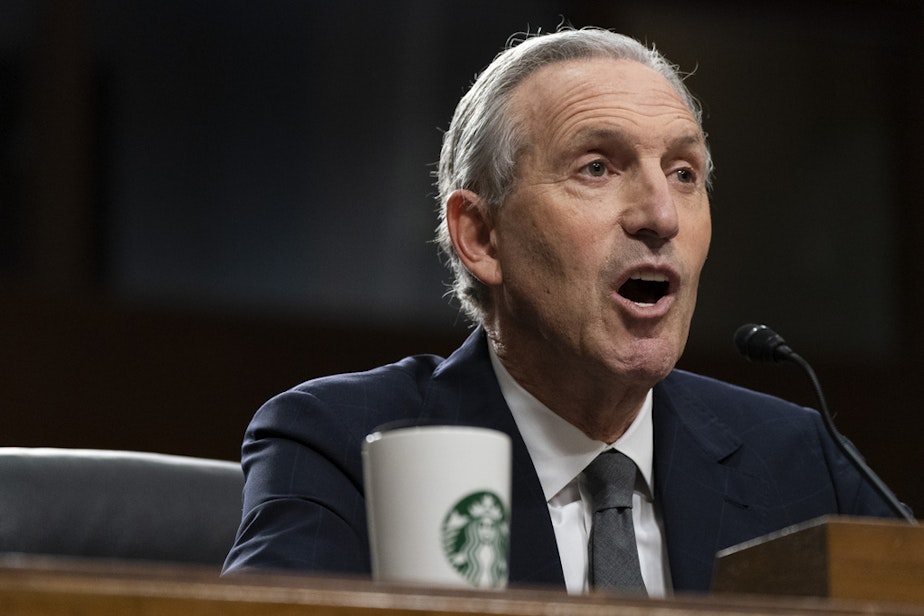Howard Schultz grilled at Senate hearing over Starbucks' 'aggressive union busting'

Howard Schultz’s morning coffee came with a shot of reproach today, as the former Starbucks CEO testified before the Senate Health, Education, Labor, and Pensions Committee.
Spearheaded by Vermont Sen. Bernie Sanders, the committee sought answers on Starbucks’ labor tactics amid accusations of illegal union busting.
Hours later, a filing with the SEC revealed another victory for the Starbucks union movement. Investors approved a shareholder resolution that will require Starbucks to conduct a third-party investigation into its labor practices. It's unusual for shareholder resolutions to succeed, and the voting results are one sign of how much pressure Starbucks is under.
Schultz is no longer at the helm of Starbucks. He handed the company over to Laxman Narasimhan last week. But Sanders and other critics say Starbucks’ anti-union campaign is the brainchild of Schultz, and they insisted he answer for the company’s labor tactics during the hearing.
RELATED: As CEO steps down, Starbucks employees strike
"Have you ever threatened, coerced or intimidated a worker for supporting a union,” Sanders asked.
Schultz repeatedly denied all accusations of union busting during the hearing.
Sponsored
"I've had conversations that could have been interpreted in a different way than I intended,” he said. “That's up to the person who received the information that I spoke to them about."
More than 500 unfair labor practice charges against Starbucks have been filed with the National Labor Relations Board, according to a report released by Sanders ahead of the hearing. NLRB says Starbucks has violated labor law more than 100 times across six states, including allegedly firing workers for unionizing.
Sanders called Starbucks “the most aggressive union-busting company in America” in the report.
Nearly 300 of Starbucks 9,000 stores across the country have voted to join the union Starbucks Workers United. About 20 of those stores are in Starbucks' home state, Washington.
Sarah Pappin works for one of them. She has been serving coffee at a Starbucks in Downtown Seattle, just "a stone’s throw from the first store" for nine years. Pappin says she's experienced Starbucks' anti-union tactics first hand.
Sponsored
"I have personally been written up for things that people never used to get written up for before the campaign," she said. "I have seen people in my store be fired for things they never would’ve gotten fired for before unionizing."
Pappin was one of several Seattle-area members of Starbucks Workers United who traveled to D.C. this week for the hearing. They are seeking a $20/hour minimum wage, guaranteed hours and regular schedules, and other benefits for Starbucks employees.
Starbucks has rolled out some benefits the union has advocated for — to non-unionized stores. The changes include raising minimum wages to an average of $17.50 an hour and rolling out credit card tipping.
Sponsored
Schultz said at the time that Starbucks could not legally implement the changes at unionized stores where bargaining was ongoing, a claim he reiterated during Wednesday's hearing. But the NLRB filed a complaint claiming Starbucks illegally withheld raises from stores with union activity.
Sen. Patty Murray, a Washington Democrat, addressed the uneven rollout of benefits during the hearing. She asked Schultz if he was “holding benefits over the heads of employees who are trying to exercise their rights.”
Schultz took offense at the question, citing his ongoing relationship with Murray.
“It’s quite personal when you bring up things that you’ve heard that are not true,” he said. “We have never taken any benefit away from someone who has joined a union.”
Alleged union busting was the focus of protests held at Starbucks' headquarters and annual shareholder meeting last week. Hundreds of Starbucks employees and labor leaders from other unions picketed the company’s Seattle offices in solidarity with workers striking across the country.
Sponsored
The following day, shareholders voted on a proposal that would require Starbucks to submit to a third-party investigation into its labor practices. The results are expected to be released this week.
Since its founding, Starbucks has marketed itself as a “different kind of company,” citing progressive benefits like a $15 minimum wage and tuition support for employees.
However, the company’s response to the union campaign has cast a shadow over that reputation.
"I try to remind people that the things that are going on with the company that make people want to unionize, they’re not new, they’re not novel," said Pappin, the longtime Starbucks employee.
"It’s always been a company that exploited its workers and it’s always been a company that tried to pretend it didn’t exploit its workers at the same time," she added.




